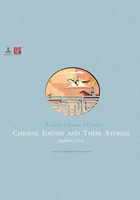
东施效颦 (dōng shī xiào pín)
Imitating Beauty
In Chinese history, there are a number of famous beauties who have survived thousands of years through poems, novels, dramas and movies. The same is true of the ugly. The expression Dong Shi Xiao Pin, or “Dong Shi imitates the eyebrow knitting” is but one example.

This expression is based on a story dating back to the late years of the Spring and Autumn Period (770-467 BC).
Xi Shi was an acclaimed beauty who was born and brought up in the State of Yue in eastern China. Throughout her life, Xi was involved not only in romantic escapades, but also in some intricate political plots. However, she was best-known for her peerless beauty.
The story goes that before she was presented to the king of the State of Wu as one of his concubines, Xi suffered from some sort of heart ailment. Therefore, she was often seen slightly knitting her brows, or frowning, and walking through the village with a hand on her chest.
But people found that, instead of detracting from her striking beauty, the eyebrow knitting bestowed a new kind of charm upon the young woman.
Dong Shi, an ugly woman living in the neighborhood, always envied Xi’s ineffable beauty and she also noticed the beauty’s eyebrow knitting and graceful gait. Therefore, Dong decided to imitate her idol’s frowning and her manner of walking. She thought this might help disguise some of her own ugliness.
But the imitation only made Dong look uglier. And whenever Dong was tottering across the village with her eyebrows knitted and a hand on her chest, wealthy people would shut their doors and the poor would turn away to avoid seeing the unpleasant contortion of her face.
Only innocent children would chase and jeer at her. The story concludes: “Alas, that woman mistook frowning for something beautiful, and was unaware that it only added beauty to a real beauty.”
Since then, the expression Dong Shi Xiao Pin is often used to warn people that blind imitation may lead to a ludicrous result. And as long as this idiom still lives in the Chinese language, Dong will remain a symbol of playing the ridiculous ape.